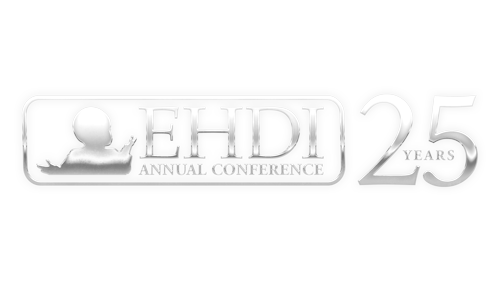2026 Early Hearing Detection & Intervention Conference
March 15-17, 2026 • Jacksonville, FL
3/10/2025 | 10:35 AM - 11:05 AM | Early Spoken Language and Elementary Literacy: Pathways for Spelling, Decoding, and Reading Vocabulary | 303
Early Spoken Language and Elementary Literacy: Pathways for Spelling, Decoding, and Reading Vocabulary
Reading is, fundamentally, a language skill. Strong spoken language in early childhood facilitates decoding, fluency, and reading comprehension for typically hearing readers (review in Quinn & Wagner, 2018). Recent evidence demonstrates that, with early amplification/cochlear implantation and effective intervention, DHH children can achieve reading skills within the average range in elementary school (Bharadwaj & Barlow, 2020; Mayer et al., 2021; Smolen et al., 2020), but less is known about the longitudinal links between spoken language and specific reading skills for DHH children who use listening and spoken language (LSL).
Sixty-six DHH participants from Read Up, a longitudinal study of reading achievement in DHH children, participated in this study. All attended a large LSL school in the southwest US. The majority of participants identified as Latinx or Hispanic. In the first year, the CELF-P2 or CELF 5 measured receptive and expressive language. One year later, the participants’ reading skills were measured using four subtests of the Woodcock Johnson IV Tests of Achievement: Spelling, Word Attack, and Reading Vocabulary-Synonyms and -Antonyms.
As expected, receptive, expressive, and core language skills were all significant predictors of children's spelling, decoding, and reading vocabulary skills one year later, p < .001, with the strongest correlation found between receptive language and reading vocabulary. An error analysis of children’s reading vocabulary performance suggested that participants who scored well below average tended to struggle with providing antonyms in general and with more abstract words in particular (e.g., easy, ugly).
While spoken and written language skills are inextricably linked for all readers, this link may be of special importance for DHH learners, who may have to overcome incomplete or delayed auditory access in order to develop reading skills. DHH children may benefit from additional focus on identifying similarities and differences in word meanings, in addition to sounds in words.
- Discuss the theoretical link spoken language and reading comprehension in typically hearing readers.
- Identify language-based predictors of spelling, decoding, and reading vocabulary in elementary-age DHH children.
- Specify potential areas of challenge within reading vocabulary for DHH readers.
Presentation:
This presentation has not yet been uploaded.
Handouts:
Handout is not Available
Transcripts:
CART transcripts are NOT YET available, but will be posted shortly after the conference
Presenters/Authors
Elaine Smolen
(Primary Presenter), Teachers College, Columbia University, es3519@tc.columbia.edu;
Elaine Smolen, PhD, CED, LSLS Cert. AVEd, is a Visiting Assistant Professor in the Special Education: Deaf and Hard of Hearing program at Teachers College, Columbia University. Her research work centers around language and literacy development for young deaf and hard of hearing children who use listening and spoken language. Smolen received her PhD in deaf and hard of hearing education from Columbia as a National Leadership Consortium in Sensory Disabilities scholar. An experienced teacher of the deaf and certified Listening and Spoken Language Specialist, Smolen has served young children with hearing loss and their families as a head classroom teacher and in an itinerant role. She holds teaching certification in the areas of deaf education, elementary education, and English.
ASHA DISCLOSURE:
Financial -
No relevant financial relationship exists.
Nonfinancial -
No relevant nonfinancial relationship exists.
AAA DISCLOSURE:
Financial -
No relevant financial relationship exists.
Nonfinancial -
No relevant nonfinancial relationship exists.
Maria Hartman
(Co-Presenter), Teachers College, Columbia University, mch33@columbia.edu;
Maria Hartman, PhD, is the Director of the Program for the Education of the Deaf and Hard of Hearing at Teachers College, Columbia University, where she teaches graduate level courses in language and literacy development as well as courses in assessment and teaching methods. Dr Hartman also supervises pre-service teachers in schools, clinics and agencies that serve deaf and hard of hearing children throughout the New York City area. At Teachers College, her research and publications focus on language and literacy development. Dr. Hartman is a NYS certified Teacher of the Deaf and Hard of Hearing with many years of classroom teaching experience.
ASHA DISCLOSURE:
Financial -
No relevant financial relationship exists.
Nonfinancial -
No relevant nonfinancial relationship exists.
AAA DISCLOSURE:
Financial -
Financial relationship with Teachers College, Columbia University.
Nature: I am a senior lecturer and program director at TC.
Nonfinancial -
No relevant nonfinancial relationship exists.
Amy Reiss
(Co-Author), Teachers College, Columbia University, alr2239@tc.columbia.edu;
Following an extended career as a lawyer and mediator, Amy Reiss enrolled in Teachers College, Columbia University to obtain a Masters degree in Deaf and Hard of Hearing Education. She is currently a teacher of the deaf in New York City.
ASHA DISCLOSURE:
Financial -
Nonfinancial -
AAA DISCLOSURE:
Financial -
Nonfinancial -
